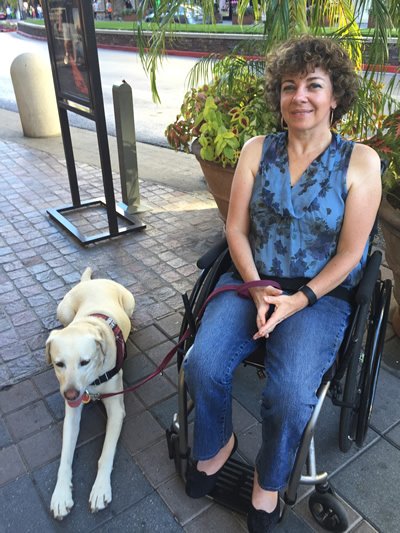Funding Late Onset Tay-Sachs Research
 My name is Vera Pesotchinsky and I was diagnosed with Late Onset Tay Sachs in 2000, after 8 years of being misdiagnosed. I have an MBA from Santa Clara University and a BA degree from Wellesley College with a double major in economics and Russian Area Studies. I was always told that my physical and speech difficulties were “psychiatric” in origin. Even when I began to stutter in high school and college, nobody recommended that I go to a neurologist and I was repeatedly sent to psychiatrists instead! When I eventually had my first abnormal MRI in 1996, it became clear that what I had was neurological, but all diagnoses that I was given were incorrect. Further testing was inconclusive, and to be quite honest, the doctors showed little interest or curiosity in digging further.
My name is Vera Pesotchinsky and I was diagnosed with Late Onset Tay Sachs in 2000, after 8 years of being misdiagnosed. I have an MBA from Santa Clara University and a BA degree from Wellesley College with a double major in economics and Russian Area Studies. I was always told that my physical and speech difficulties were “psychiatric” in origin. Even when I began to stutter in high school and college, nobody recommended that I go to a neurologist and I was repeatedly sent to psychiatrists instead! When I eventually had my first abnormal MRI in 1996, it became clear that what I had was neurological, but all diagnoses that I was given were incorrect. Further testing was inconclusive, and to be quite honest, the doctors showed little interest or curiosity in digging further.
So as my health deteriorated, I continued with my life and made adjustments as necessary. I had always been quite clumsy, but never suspected there could be a medical reason for it. That was just the way I was, and I assumed that to some degree, everyone had the same difficulties that I did. After all, I do not know anything else and have nothing to compare it to. In high school, I ran cross-country, but every year, I seemed to get slower. In the last couple years of school, I began to fall. The last time I remember being able to run at all, I was 18 years old and a freshman in college. But I could live my life without running. Then, I had difficulty walking up and down stairs. So I slowly had to make adjustments, but I just did the best I could with what I had. When I finally got the LOTS diagnosis, it was actually somewhat of a relief because all of my difficulties finally began to make sense!
Even with the LOTS diagnosis, I was determined to not let it interfere with my life. I finished my graduate degree, worked, lived on my own, drove a car, and spent time with my friends. But despite my not wanting to admit this, I am slowly getting worse. I began to use a walker about 5 years ago, and I currently use a wheelchair outside the house in the evenings, or in unfamiliar environments. Even with the walker, I fall quite often, and several of my falls have resulted in broken bones. About 2 years ago, I had to give up driving and move back to my parents’ house. So at 42, I have had to give up a lot of my independence and rely on my parents more than I would like. I am having challenges now in my 40s that many people don’t experience until their 80s or 90s, or never at all.
There is no cure.
There is currently no cure for Tay Sachs, in its infantile, juvenile, or adult onset forms, nor for many other more common neurological diseases. My mother is very involved in research and I know that a lot has been done in the last 15 years in order to find a treatment, and research is moving forward. Being diagnosed today is quite different than it was 15 years ago, and despite the fact that there are few patients, there is progress being made. I am very grateful to researchers that have devoted their time and talent to find a treatment for this rare disease. I am also thankful to all the parents and friends that have helped to finance research up to this point. Although Tay-Sachs is very rare, we know that if a cure is found for Tay-Sachs, it would help to find cures for other neurological diseases.
Unfortunately, nothing can be done without money, and we need funds to continue research, to satisfy FDA requirements, and to conduct clinical studies. We cannot stop now as some of the technologies that are being developed have real promise.
So please help and contribute what you can to give hope to both myself and all those struggling with genetic neurological diseases. I appreciate and am grateful for your support.
Thank you
Vera
Donate by Mail
Checks payable to "NTSAD" may be mailed to:
NTSAD
c/o Vera's Research Fund
2001 Beacon St, Suite 204
Boston MA 02135
UPDATE - January 2020
There is positive data from animal studies that suggest gene therapy could be translated to adults affected by Late Onset Tay-Sachs. Two children affected with infantile Tay-Sachs who received gene therapy (as part of an expanded access study) seem to show disease stabilization to date, which is quite promising.

